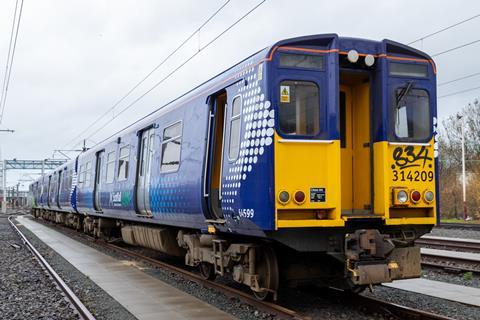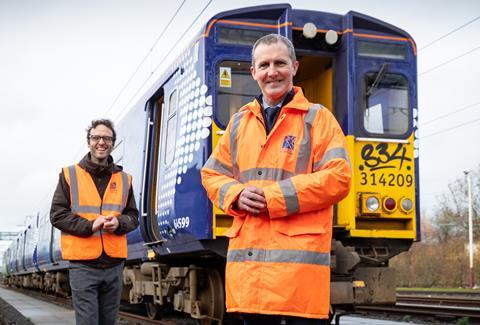
UK: Scottish Enterprise, Transport Scotland and the Hydrogen Accelerator at the University of St Andrews have appointed a consortium of industry partners to produce a demonstrator hydrogen fuel cell multiple-unit.
The Zero Emission Train Project will see a withdrawn Class 314 electric multiple-unit made available by ScotRail converted into a ‘deployment-ready and certified’ development platform for hydrogen technology providers and academics.
The unit is scheduled to be demonstrated during the COP26 Climate Change Conference which is to be held in Glasgow on November 1-12 2021.
Consortium
The industry consortium is led by hydrogen fuel cell integration specialist Arcola Energy. It includes Arup and Abbott Risk Consulting as part of an integrated delivery team, with AEGIS providing regulatory third-party verification.
The work will be undertaken at the Bo’ness & Kinneil Railway heritage line, which will provide engineering facilities and support for testing and public demonstrations.
Arcola previous worked with Brodie Engineering on design concepts under the first phase of the Zero Emission Train Project. As leader of the second phase consortium it will be responsible for system engineering, design and integration, and project demonstration.
Arcola is to supply its existing A-Drive technology, which will be adapted to meet rail safety and compliance requirements. The company said the use of existing technology would significantly reduce development time and costs, with a complete hydrogen powered system to be delivered in 10 months.
Arup will provide specialist rail engineering expertise covering technical concepts, high-level design and safety strategy. It will also work with the Hydrogen Accelerator to plan a pathway for the deployment of hydrogen trains in Scotland.
Clare Lavelle, Scotland Energy Business Lead at Arup, said the project would be ‘a crucial step in helping us understand the practical challenges of using hydrogen traction power on our railways’.
Abbott Risk Consulting will provide specialist product development compliance and health and safety management expertise.
AEGIS Certification Services will provide third-party safety certification and compliance verification.
Objectives
The project has six key objectives:
- to show that there is the capability to undertake the conversion work in Scotland;
- to work with regulatory bodies to develop standards and controls for the use of hydrogen fuel cells on passenger trains;
- to inform the development of a policy for the use of independently-powered multiple units to meet the target of zero emissions from passenger trains in Scotland in 2035;
- to demonstrate the operation of hydrogen passenger rolling stock;
- to provide the supply chain with the opportunity to develop skills and knowledge of fuel cell passenger trains, including hydrogen supply and refuelling infrastructure;
- to provide educational institutions with the opportunity to develop their skills and advance their knowledge of the application of hydrogen to the rail industry.
Equipping the demonstrator unit to operate on Network Rail infrastructure could form a third phase of the project, should this be required.
Decarbonisation action plan

‘Our rail decarbonisation action plan sets out to make our passenger railways emissions free by 2035, but to maximise our climate change ambitions, there is also a requirement to look at what we do with retired stock’, said the Scottish Government’s Transport Secretary Michael Matheson when the appointment of the consortium was announced on December 29.
‘If we can bring those back into use in a carbon neutral way, there are huge climate gains to be made.’
Dr Ben Todd, CEO of Arcola Energy, said the project was ‘an excellent opportunity for industry leaders in hydrogen, rail engineering and safety to collaborate with Scottish technology providers to develop a deployment-ready solution.’



